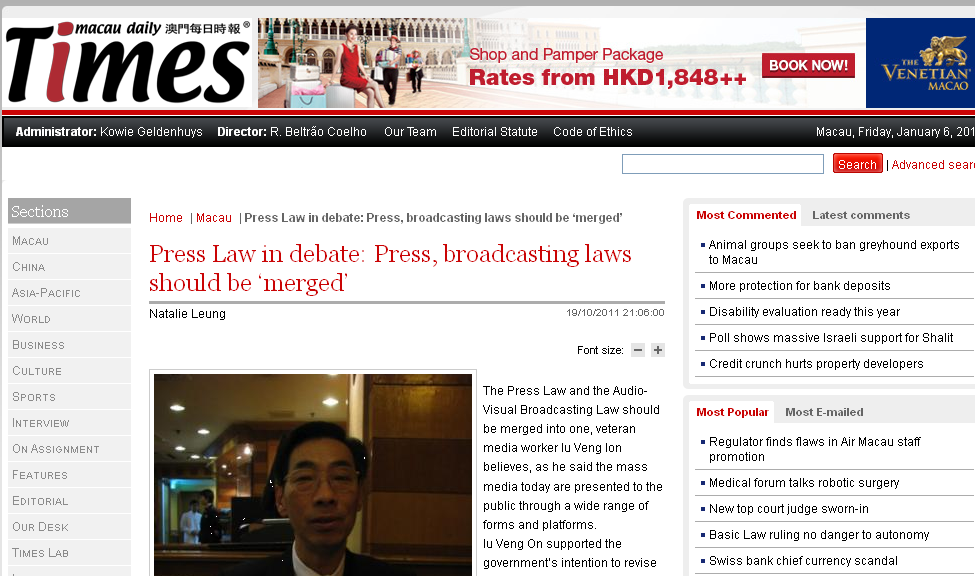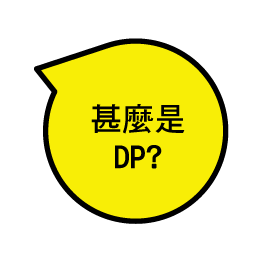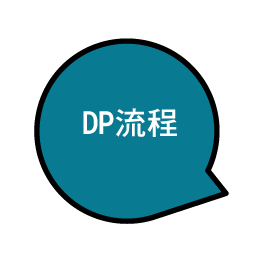
原文鏈接

Iu Veng Ion, vice-director of “Today Macao” and vice-chairman of the Macau Media Workers Association
The Press Law and the Audio-Visual Broadcasting Law should be merged into one, veteran media worker Iu Veng Ion believes, as he said the mass media today are presented to the public through a wide range of forms and platforms.
Iu Veng On supported the government’s intention to revise the two laws, which he told the Macau Daily Times in an interview are “no longer in pace with society” and in need of a “major revision”.
Iu is the vice-director and editor-in-chief of local Chinese-language daily newspaper Today Macao and the director of Chinese-language weekly tabloid Joy Post. Besides the vice-chairman of the Macau Media Workers Association he is also the guest host of a morning phone-in talk show on Radio Macau, Chinese channel, as well as a commentator of a current affairs program at MASTV.
“It would better suit the current environment if the Press Law and the Broadcasting Law could be combined into one Communications Law, with the publishing and broadcasting sectors separated in detail from within [the law],” he suggested.
“The news media are very diversified nowadays, they can appear in the form of [conventional] newspapers and electronic newspapers, or presented through the use of multimedia such as videos on the Internet,” he said.
In Hong Kong and Taiwan for example, some new outlets also make use of animations or simulation videos to deliver news when no real images of the actual scene are available.
‘It would better suit the current environment if the Press Law and the Broadcasting Law could be combined into one Communications Law, with the publishing and broadcasting sectors separated in detail from within [the law]’
Pointing at a more advanced development of the industry in the neighbouring HKSAR and in Taiwan, Iu urged the government to study the experience in these places in order to bring to completion the revision of the two laws.
However, Iu pointed out that while regulations are necessary to be included in the laws, mechanisms to help promote the industry and especially small and medium sized publishing enterprises are also needed.
He said he hoped the Administration would at the same time amend a separation regulation enacted after the 1999 handover, in which he said local newspapers founded after a designated date would not be able to receive a subsidy from the government.
“It’s not fair,” Iu reiterated.
Before the change, local newspapers were able to receive a government subsidy to support their operations as long as they had been established for five years.
The two laws should also reinforce reporter’s right to interview and the public’s right to be informed, he added.
“Sometimes reporters were prohibited by police from taking photos [of demonstrations] even though they were outside the sealed-off areas, but at the same time passers-by were using mobile phones to take photos of the protests,” he recalled.
Meanwhile, Iu also told MDTimes that the provisions in the law specifying what could constitute a crime in reporters work should be eliminated.
“Everyone can be charged with defamation and malicious aspersion just by citing the Civil Code. It’s pointless to have separate provisions only for media workers,” he stressed.
Press Council in doubt
The Press and Audio-Visual Broadcasting Laws that were enacted in August 1990 officially laid down the setting up of a Press and a Broadcasting Commission, but little progress has been made over the past 20 years.
Since the Government Information Bureau (GCS) announced the plan to revise the two laws, concerns have been raised particularly within the media industry about the possibility for the government to put the matter on the table again.
Yet, Iu, who first began in the media industry in 1987 as the editor of Today Macao, said the very first step for the SAR Government should be to ascertain through scientific research whether or not it’s necessary to set up these two commissions.
‘Everyone can be charged with defamation and malicious aspersion just by citing the Civil Code. It’s pointless to have separate provisions only for media workers’
“If they are necessary, why weren’t they formed many years ago? Their existence has already become doubtful,” Iu said.
“We don’t see that the development of Macau’s publishing industry has been hindered due to the absence of the commissions during all these years.”
According to Iu, if the laws are “well drafted”, such a council will not be required at all.
In addition, he pointed out that since there is no broadcasting bureau or a department that is responsible for overseeing the broadcasting sector in Macau, it is not appropriate to establish a Broadcasting Commission.
As to whether the laws should stipulate a journalists code, Iu remarked that it would be more effective for local media associations to “propose their own guidelines for industry practitioners to follow”, similar to the situation in the United States and some other countries.
On the other hand, fears that the law revision may be an attempt by the government to tighten freedom of the press have also been felt among media workers in Macau.
Iu said it’s “too early to say” whether the government has the intention to control the local media, adding that he believed it would be unlikely, as “Chief Executive Fernando Chui Sai On may not be able to finish revising the entire law within his current term of office”.
He is confident that, however, a thorough revision to be completed in five year’s time by 2016 is “achievable”.
‘We don’t see that the development of Macau’s publishing industry has been hindered due to the absence of the commissions during all these years’
More opinions required
Nevertheless, in order to clarify public concerns, Iu urged the government to consider the point of view of civil society, lawyers and the publishing industry rather than “just” the media sector.
“Most of the time the government’s legal advisors are not professional enough. Instead, lawyers know more about what is workable and what is not because they have close contact with the users – the public,” Iu explained.
Furthermore, the veteran media worker suggested the government should invite relative industry practitioners to take part in the drafting process of the revised bills.
“The making of the Labour Relations Law involved the participation of business and worker representatives. The Macau Basic Law also had a consultation and a drafting committee,” he recalled.
Although GCS has several times met with local media workers to discuss the revision of the two laws, Iu said he hoped the discussions could be “more in-depth” and officials are “more open” to opinions in the future.









